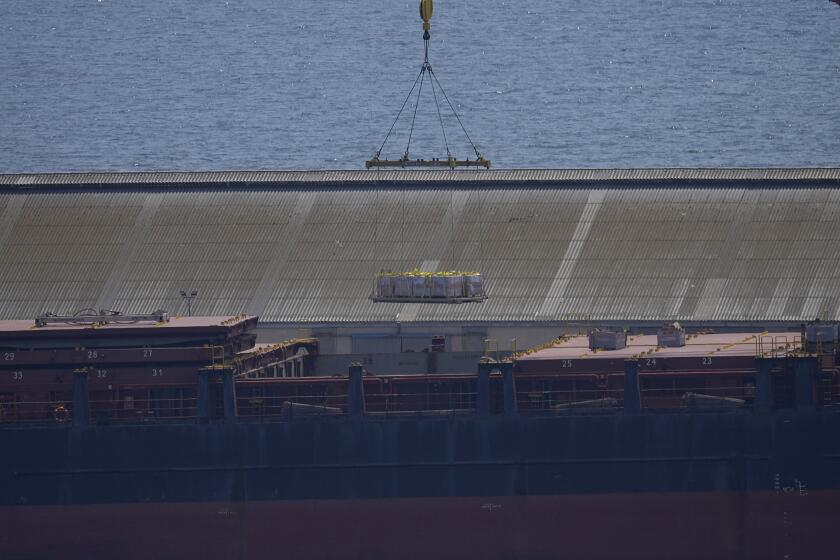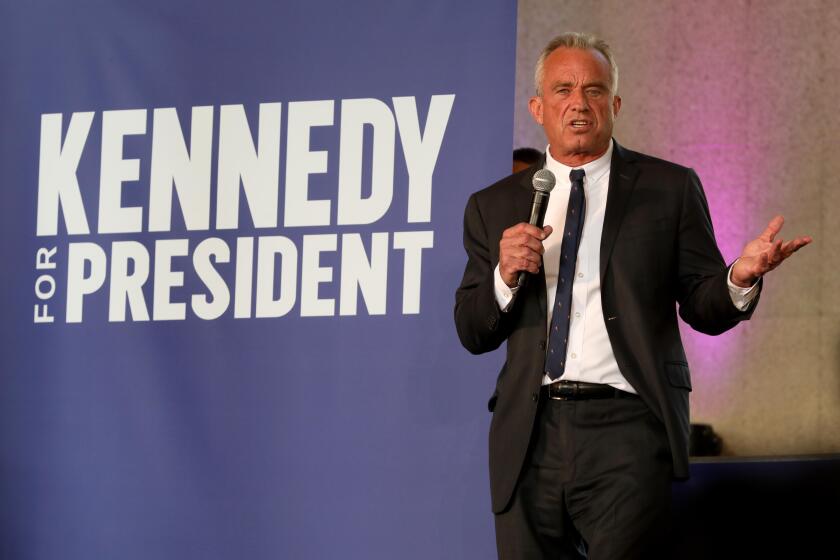Gorbachev Departing for U.S Amid Tumult : Soviet Union: Reforms run into crises that leave the nation in panic. But there’s no turning back for him. : News ANALYSIS
Mikhail S. Gorbachev goes to Washington this week as a man beleaguered.
Halfway into the task he set himself, reforming the Soviet Union is proving far bigger and more difficult than anyone had imagined, and yet there is no going back.
“We can only go forward, but each step takes twice the energy of the last,” Leonid I. Abalkin, the vice prime minister in charge of economic policy, said last week as he discussed the strong resistance to the government’s latest reforms.
“People are experiencing pain and think, ‘It was not supposed to be like this.’ But hard work does hurt, and it will take a lot of hard work to get us out of these crises.”
Perestroika, as Gorbachev’s reform program is known, has run into three interlinked crises--political, economic and ethnic--that have grown increasingly acute in the past two years. All are at new peaks as the Soviet president heads for Canada and the United States today.
As Gorbachev tries to deal with the attempts by the Baltic republics of Lithuania, Latvia and Estonia to secede from the Soviet Union, violence has flared again in Armenia. The Soviet Union itself appears headed at times for disintegration, largely because the small republics believe they would be better off free of the giant and its problems.
As the government makes its first major moves to shift the Soviet economy from central planning and state ownership to market forces and entrepreneurship, panic has set in all over the country because of the higher prices and increased unemployment that will result. But the changes are, in the view of radical economists, only another set of half-measures, limited steps taken too late without sufficient political resolve to achieve real progress.
As Gorbachev seeks support for further reforms in advance of a Communist Party congress planned for early July, the country’s new, still emerging political structure--based on glasnost, or openness--seems more likely to produce chaos than results, and its ability to cope with the crises is very much in doubt.
And, inevitably, as these crises deepen, there are questions here and abroad about Gorbachev’s own position, about his leadership, about how long he will last, about threats from the conservatives and the military, about who might replace him.
This questioning has created in recent months a fourth crisis--a crisis of confidence, not just in Gorbachev’s ability to lead but in the nation’s ability to keep up with him.
“Managing a revolution is never simple, and what we have undertaken is a revolution, a change as big and as tumultuous as the revolution of October itself,” Arkady A. Maslennikov, Gorbachev’s press secretary, said, referring to the Bolshevik Revolution in 1917. “And it is quite true that our president is having difficulties now, that there are serious problems, that he is being criticized for the way the government is handling them. . . .
“But there should be no mistaking his commitment to perestroika, no mistaking of the country’s concerns and fears for a weakening of will. We are going forward--it is just harder and slower and more painful than we anticipated.”
The euphoria that came with the first reforms has long since faded and has been succeeded, as the full scope of the country’s problems has become apparent, by a pessimism so great that many people here feel that not even a generation will be enough to correct them.
Recent surveys for the country’s leadership by the Soviet Center for the Study of Public Opinion show that three-fourths of those questioned across the country foresee mounting economic problems and even a “disaster” (14%) in the coming year. Politically, nearly 70% see mounting tensions and even a civil war (11%).
Trust in the country’s leadership has continued to decline, according to the center’s surveys, and the most trusted institutions now are the churches, the press and the armed forces. The Communist Party is rated as “trusted” by only 16% of the respondents, the government by 23%.
“It would be easier for people if we could tell them, ‘Do this today, and tomorrow you will get that,’ but we cannot,” Abalkin commented last week. “This is not because we don’t know what we are doing; it is because what we are attempting has never been done on this scale or in these circumstances.”
When they launched the reforms shortly after coming to power in 1985, Gorbachev and his supporters in the Soviet leadership thought they would be largely corrective, a rejuvenation and re-energizing of the political structure after years of stagnation under the late President Leonid I. Brezhnev and a restructuring of the economy to give Soviet enterprises a chance to modernize and compete.
“He did not come with all his ideas prepared for perestroika, “ Georgy Shakhnazarov, a leading political scientist and a presidential adviser, commented earlier this year. “He was prepared to the extent that he understood this system could not survive any longer, that we had to restructure and make really revolutionary changes in the system. Step by step, we go deeper.”
Yegor Yakovlev, the editor of the avant-garde weekly newspaper Moscow News, similarly argued in his column last week that too many people, here as well as abroad, are concentrating on the problems the Soviet Union faces. In their pessimism, he says, they have failed to analyze how far it has come in the five years under Gorbachev and how the political system and society have already changed.
“The debates about the necessity of a market economy are over,” Yakovlev said. “What we are arguing about is whether to introduce it next Tuesday or Thursday a week. The constitutional autocracy of the Communist Party is giving way to the multi-party system. The presidency has put an end to an omnipotent party bureaucracy. Where you see chaos, I perceive the dismantling of the old system.”
These pluses outnumber the minuses in Yakovlev’s calculus, and that should be grounds for cautious optimism.
Nikolai Shishlin, a senior Communist Party official briefing reporters in Washington on Monday in advance of Gorbachev’s visit, was similarly upbeat and sought to calm fears that the Soviet president has been irreparably damaged.
“For all the tumultuous political process that has developed in Soviet society, for all the posturing and emotion that is building up inside the country, for all the painful and critical nature of the period we are living through, the expansion of perestroika is proceeding,” Shishlin said. “The position of Gorbachev at present is a strong position and a position of authority.”
But the scope of the multiple crises nonetheless is daunting, and top government and Communist Party officials do warn openly now of the danger of “a social explosion” because of the growing tensions within the country.
Largely as a result of years of economic mismanagement, if not an economy that was “deformed” throughout its development, as Soviet officials now say, the Soviet Union is collapsing as a political, economic and social system.
Not only can the country, albeit a military superpower, not feed, clothe and house its own people, but its old political structure and indeed Soviet society itself have not been able to cope with the resulting crisis.
Boris N. Yeltsin, the radical populist, who continues to emerge as Gorbachev’s principal rival, warns that time is quickly running out for perestroika and that, without major changes in the reform program as well as in the leadership, there will be “a revolution from below.”
“Mikhail Gorbachev has less than a year, perhaps less than six months, to make perestroika work,” Yeltsin told members of the Russian Congress of People’s Deputies as he campaigned over the weekend for the chairmanship of the congress, a post that would make him, in effect, president of the Soviet Union’s largest republic. “The people’s patience is wearing out. An explosion is coming.”
Conflicts that divide President Bush and Soviet President Mikhail S. Gorbachev. And Washington tries to forge a policy toward the Soviets. H1.
More to Read
Start your day right
Sign up for Essential California for news, features and recommendations from the L.A. Times and beyond in your inbox six days a week.
You may occasionally receive promotional content from the Los Angeles Times.






